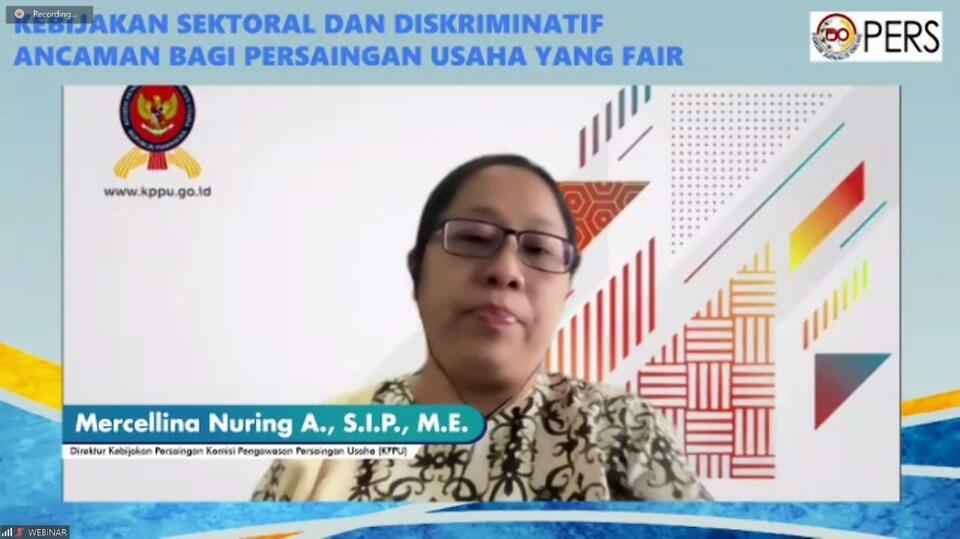BPOM Asked to Reassess BPA Labeling Plans for Water Gallons

Jakarta. Stakeholders are calling for the Food and Drug Monitoring Agency or BPOM to reassess its plans to slap a Bisphenol A, commonly shortened as BPA, labels on reusable water gallons.
The BPOM is planning to issue a label that warns consumers that a polycarbonate water gallon might “potentially contain BPA”. However, stakeholders —ranging from ministries to academics— recently called for BPOM to take into account all aspects before proceeding with the plan.
Evita Mantovani, the deputy assistant for domestic market promotion at the Economic Affairs Coordinating Ministry, said aspects to consider included the economy, health, environment, and business competition.
"There needs to be a more in-depth assessment in all these aspects,” Evita said at a forum themed “Sectoral and Discriminative Policies: A Threat to a Fair Competition” on Wednesday.
The reusable water gallon industry estimated that the BPA labeling could lead to an additional cost of Rp 16 trillion or about $1 billion. Approximately 40,000 people are working in the industry. Assuming that a worker had to feed four family members, this would mean about 160,000 people rely on the reusable water gallon industry.
"We should take this into account when analyzing the [BPA labeling] policy. The loss from 170 million of polycarbonate reusable gallons can potentially reach Rp 6 trillion. Not to mention the replacement cost for non-reusable gallons of about Rp 10 trillion. The BPA labeling, if in force, could cause a [financial] burden of Rp 16 trillion,” Evita added.
Riris Marito, an official at the Industry Ministry, echoed the same sentiments as Evita. Riris also called for BPOM to include all stakeholders in its BPA labeling discussions.
The Business Competition Supervisory Commission (KPPU) said that businesses should be able to compete fairly with one another. Mercellina Nuring of KPPU warned a discriminatory policy could affect producers’ competitiveness.
“We have made a business competition policy assessment checklist. Perhaps we will try to coordinate and discuss [this checklist] with the BPOM if the BPA labeling discourse continues,” Mercellina said, while adding that business competition-related articles on the BPA policy should embrace equal treatment.
Likewise, Ningrum Natasya Sirait, a professor at the Law School of North Sumatera University, urged BPOM to not only pay attention to the health aspect, but also the business competition.
“Any regulation regardless of its context must undergo a competition checklist to prevent artificial barriers that can burden companies in the competition market, which will ultimately [affect] the people,” Ningrum said.
Willy Bintoro Chandra, of Indonesian Association of Water Companies Central Java regional board, found the proposed BPA labeling to be discriminatory, as it would only affect reusable water gallons.
The use of polycarbonate plastics, which contain BPA, is pretty common in the processing industry. In 2019, BPOM issued a regulation regarding processed food packaging and the acceptable quantities of food contact substance. However, BPOM’s BPA labeling plan is only applicable to reusable gallons. Willy questioned why BPOM did not require other processed food packaging to also include a BPA label.
Willy also feared that this labeling could deal a fatal blow to reusable water gallons.
“This product has saved the bottled water industry amid the Covid-19 pandemic and has [helped driven] recovery from the crisis,” Willy said.
Ahmad Zainal Abidin, a polymer expert from Bandung Institute of Technology, said that the labeling on polycarbonate gallons could mislead the public. According to Ahmad, it is impossible for a reusable gallon to be BPA-free. Slapping a BPA-free label on polyethylene terephthalate (PET) gallons can also be misleading because they are not made from polycarbonate.
Tags: Keywords:POPULAR READS
Rupiah Declines Against Dollar Amid Geopolitical Unrest
The Indonesian rupiah depreciated against the US dollar in Tuesday's trading session, driven by escalating tensions between Iran and IsraelNasdem Vows to Honor the Constitutional Court Ruling on 2024 Presidential Election Dispute
Nasdem's Willy Aditya commits to respect the Constitutional Court's ruling on the 2024 presidential election dispute.Jokowi Calls for Internal Meeting to Prepare for Economic Fallout from Iran-Israel Conflict
Minister Airlangga Hartarto announced President Jokowi's plan to hold an internal meeting on Tuesday to address the Iran-Israel conflict.Coach Shin Tae-yong Voices Outrage Over Referee Decisions After Indonesia's Defeat to Qatar
Indonesia's AFC U-23 defeat to Qatar leaves Garuda squad with 9 players, bottom of Group A.Knife Attack Against Bishop, Priest in Sydney Treated as Terrorism, Police Say
Police arrested a 16-year-old boy Tuesday after the stabbing at Christ the Good Shepherd Church.Popular Tag
Most Popular






















